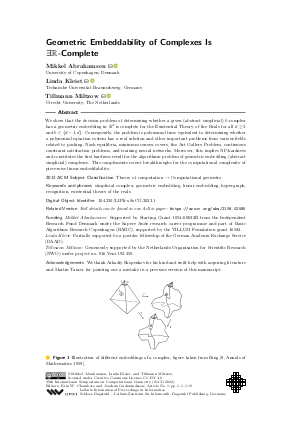@InProceedings{abrahamsen_et_al:LIPIcs.SoCG.2023.1,
author = {Abrahamsen, Mikkel and Kleist, Linda and Miltzow, Tillmann},
title = {{Geometric Embeddability of Complexes Is \exists\mathbb{R}-Complete}},
booktitle = {39th International Symposium on Computational Geometry (SoCG 2023)},
pages = {1:1--1:19},
series = {Leibniz International Proceedings in Informatics (LIPIcs)},
ISBN = {978-3-95977-273-0},
ISSN = {1868-8969},
year = {2023},
volume = {258},
editor = {Chambers, Erin W. and Gudmundsson, Joachim},
publisher = {Schloss Dagstuhl -- Leibniz-Zentrum f{\"u}r Informatik},
address = {Dagstuhl, Germany},
URL = {https://drops.dagstuhl.de/entities/document/10.4230/LIPIcs.SoCG.2023.1},
URN = {urn:nbn:de:0030-drops-178518},
doi = {10.4230/LIPIcs.SoCG.2023.1},
annote = {Keywords: simplicial complex, geometric embedding, linear embedding, hypergraph, recognition, existential theory of the reals}
}

 Creative Commons Attribution 4.0 International license
Creative Commons Attribution 4.0 International license











